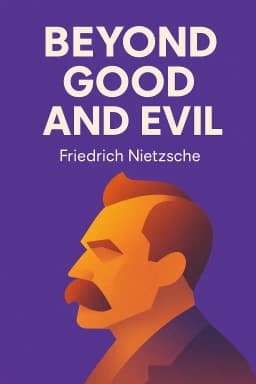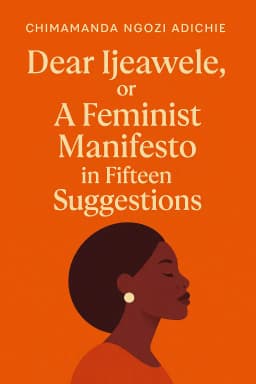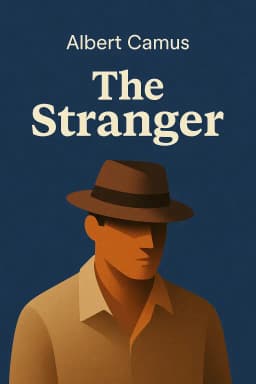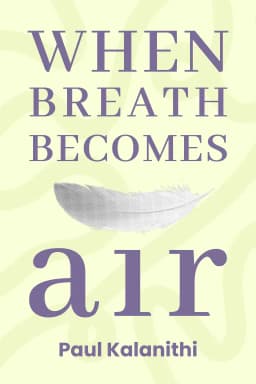
The Tyranny of Kindness
Golden Hook & Introduction
SECTION
Michael: Alright Kevin, quick—if Friedrich Nietzsche had a modern-day self-help book, what would its title be? Kevin: Oh, easy. 'That Thing That Didn't Kill You? It's Coming Back for Round Two.' Or maybe, 'How to Win Friends and Alienate Absolutely Everyone Else.' Michael: Perfect. That's exactly the territory we're in today. We're diving into one of the most explosive books in philosophy, Beyond Good and Evil by Friedrich Nietzsche. Kevin: The man with the world's most intimidating mustache. I feel like you need a PhD just to pronounce his name. Michael: And his ideas are even more intimidating. What's wild is that he had to self-publish this book in 1886. It sold just over a hundred copies in its first year. He was totally alone, writing for a future he was convinced wouldn't understand him. Kevin: Wow. So he was basically shouting into the void. And that void, it seems, eventually shouted back. Michael: It absolutely did. And his first shout in this book is aimed directly at the heart of all philosophy: the idea of Truth itself.
The Philosopher's Confession: Deconstructing the 'Will to Truth'
SECTION
Kevin: Right, the "Will to Truth." It sounds so noble, like something every great thinker should have. What's Nietzsche's problem with it? Michael: His problem is that he doesn't believe it's real. He opens the book with this incredible, provocative question: "Supposing that Truth is a woman—what then?" Kevin: Okay, I'm listening. Where is he going with this? Michael: He argues that for centuries, philosophers have been trying to "win" Truth with their dogmatic, clumsy, and overly serious approaches. He says they've been terrible suitors. They haven't been charming or perceptive; they've just been forceful and demanding. And as a result, Truth has remained elusive. Kevin: So he's saying philosophy isn't a science, it's a failed romance? Michael: In a way, yes. He believes that what philosophers call their "Will to Truth" is actually a mask for something else entirely. He says every great philosophy, from Plato to Kant, is ultimately "the confession of its originator, and a species of involuntary and unconscious auto-biography." Kevin: Hold on. An autobiography? So when Plato is talking about the world of perfect Forms, he's really just talking about himself? Michael: That's precisely Nietzsche's point. He argues that philosophers don't arrive at their conclusions through pure, cold logic. They start with a deep-seated moral prejudice, a feeling about how the world ought to be, and then they build an elaborate intellectual fortress to defend that feeling. They're not detectives; they're lawyers for their own instincts. Kevin: That’s a pretty cynical take on 2,000 years of thought. Can you give me an example? Michael: The Stoics are a perfect one he uses. Their famous motto was to live "according to Nature." It sounds so wise and harmonious, right? Just align yourself with the natural order of things. Kevin: Yeah, sounds like a mindfulness app slogan. "Flow with the river of Nature." Michael: Exactly. But Nietzsche just laughs at them. He asks, "You noble Stoics, what fraud of words!" He points out that Nature itself is wasteful, indifferent, chaotic, unjust, and without purpose. It's a storm of creation and destruction. To live "according to Nature" would mean to live just like that—to be a predator, to be indifferent, to be chaotic. Kevin: Oh, I see. So they weren't living according to actual Nature. They were living according to their idea of Nature. Michael: Precisely. They created an idealized, orderly, moral version of Nature in their heads and then pretended they were humbly submitting to it. In reality, Nietzsche says, they were tyrants. They were trying to impose their own grim, stoic, self-controlled morality onto the universe and call it "Nature's Law." It was a magnificent piece of self-deception. Kevin: So every philosophical system is just a projection of the philosopher's personality? Their own personal "Will to Power" dressed up as universal truth? Michael: You've hit on the core of it. And that leads directly to his most famous, and most dangerous, idea. It's not the will to truth that drives us, or even the will to survive. It's something much more fundamental.
Beyond Good & Evil: The Will to Power and the Two Moralities
SECTION
Kevin: Alright, let's get to it. The Will to Power. This is the one that gets him into trouble, right? It conjures up images of dictators and conquest. Michael: It does, and that's one of the great misinterpretations of his work, one that was tragically co-opted by the Nazis decades after his death, despite Nietzsche himself being fiercely anti-nationalist and anti-antisemitic. For Nietzsche, the Will to Power isn't primarily about political domination. It's the fundamental drive of all life. Kevin: What do you mean by "drive"? Like, more basic than survival? Michael: Yes. He argues that self-preservation is just a side effect. The real drive is to grow, to expand, to overcome obstacles, to discharge one's strength, to become more than you are. A tree reaching for sunlight, an artist creating a masterpiece, an athlete pushing their limits—that is all the Will to Power in action. It's the will to self-overcoming. Kevin: Okay, that's a much less sinister way of putting it. So how does this connect to "good and evil"? Michael: Because, Nietzsche says, this fundamental drive has given rise to two completely opposite types of morality throughout history. He calls them "master morality" and "slave morality." Kevin: Master and slave morality. The language alone is so provocative. Break that down for me. Michael: Let's start with master morality. Think of the noble warriors of ancient Rome or the Greek heroes in Homer. For them, "good" was a self-description. "Good" meant noble, strong, powerful, proud, brave—everything they recognized in themselves. "Bad" simply meant common, weak, cowardly, pathetic. It was a morality created by the rulers, the creators. Kevin: So it’s a morality of self-glorification. "What is like me is good." Michael: Exactly. Now, what happens to the people they rule over? The oppressed, the weak, the sick, the enslaved? They suffer. And out of that suffering, a deep, simmering resentment grows. They look at their masters—so powerful, so carefree, so cruel—and they can't fight back physically. So they fight back morally. Kevin: How do you fight back morally? Michael: You perform what Nietzsche calls the most brilliant act of revenge in human history: the transvaluation of values. You take the master's morality and you flip it on its head. Kevin: Wait, what? Michael: Think about it. The masters are proud? You declare pride a sin and call it "vanity." The masters are powerful? You say, "Blessed are the meek, for they shall inherit the earth." The masters are wealthy? You say it's easier for a camel to pass through the eye of a needle than for a rich man to enter heaven. The masters are cruel? You elevate pity, kindness, and sympathy to the highest virtues. Kevin: Whoa. So everything we consider "good"—humility, compassion, turning the other cheek—Nietzsche is saying this was born out of the hatred of the weak for the strong? Michael: He argues it was a clever, spiritual revenge. The "slaves" couldn't win on the battlefield, so they convinced everyone, including the masters themselves, that the masters' very nature was "evil" and their own weakness was a sign of "goodness." He says this slave revolt in morality, which he primarily associates with the influence of Judaism and then Christianity, was a victory that has defined Western civilization for two millennia. Kevin: Hold on. This sounds... incredibly problematic. Is he saying being kind and empathetic is a 'slave' trait? That sounds like something a supervillain would say. Michael: And that's the crucial point where people get him wrong. He's not necessarily advocating for a return to brute force. He's acting as a genealogist, a doctor of culture. He's diagnosing the origin of our values. He wants to show us that our concepts of "good" and "evil" aren't divine commandments handed down from on high. They are human, all-too-human inventions, born from specific historical and psychological conditions. Kevin: So when someone says, "You should be more humble," Nietzsche would whisper in your ear, "Who benefits from you being humble?" Michael: Precisely. He wants to unmask the Will to Power hiding behind even the most seemingly selfless virtues. He wants us to move beyond this simplistic binary of good and evil that was created in a specific power struggle. Kevin: Okay, so if traditional truth is a sham and our morality is born from resentment, where does that leave us? Just total chaos? Is there nothing to hold onto? Michael: That is the terrifying question that hangs over the entire book. And Nietzsche's answer is not chaos. It's a challenge. It's a vision for a new kind of human.
The Free Spirit: Forging a New Nobility
SECTION
Kevin: A new kind of human? After all that deconstruction, what is he trying to build? Michael: He's trying to sketch a portrait of what he calls the "free spirit," or the "noble soul." And this isn't about an aristocracy of money or bloodline; it's an aristocracy of the spirit. It's the individual who has the courage to stand alone and create their own values. Kevin: Create their own values? What does that even mean in practice? Michael: It means, first and foremost, you have to be willing to be misunderstood. The free spirit is, by definition, an exception to the herd. Nietzsche uses the powerful image of the philosopher needing to wear a "mask." Not to deceive, but to protect themselves from the shallow, prying eyes of the majority who can't comprehend their journey. Kevin: So it's a kind of self-preservation for the mind. Michael: Yes, and it requires a radical re-evaluation of suffering. While slave morality sees suffering as something to be eliminated at all costs, the noble soul sees it as an indispensable tool for growth. He has this incredible line: "The discipline of suffering, of great suffering—know ye not that it is only this discipline that has produced all the elevations of humanity hitherto?" Kevin: That's the "what doesn't kill you makes you stronger" idea, but on a much grander, more terrifying scale. Michael: Exactly. The free spirit doesn't seek comfort; they seek challenges that will forge them into something stronger, deeper, more comprehensive. This creates what he calls the "pathos of distance." Kevin: That sounds incredibly lonely. And maybe a bit arrogant? What does 'pathos of distance' even look like in real life? Is it just looking down on everyone? Michael: It's less about looking down on others and more about a profound sense of self-reverence and separation within your own soul. It's the ability to not be entangled in the petty judgments, the praise and blame, of the herd. It's the inner space you create that allows you to be your own judge, to set your own goals, and to hold yourself to a higher standard. Kevin: So it's about emotional and intellectual independence. Michael: The highest form of it. But it's also incredibly dangerous. This is where his most famous aphorism, also from this book, comes in: "He who fights with monsters should be careful lest he thereby become a monster. And if thou gaze long into an abyss, the abyss will also gaze into thee." Kevin: Chilling. So in the process of overcoming the herd, you risk becoming a different kind of monster yourself. Michael: The risk is immense. To go beyond good and evil is to walk a tightrope without a safety net. You have to navigate the abyss of nihilism, the temptation of your own power, and the crushing weight of solitude. Most will fail. But for Nietzsche, the possibility that a few might succeed is the only hope for the future of humanity.
Synthesis & Takeaways
SECTION
Michael: So when you put it all together, Nietzsche isn't just an edgy nihilist trying to tear things down. He's a cultural physician trying to clear the ground of what he sees as a 2,000-year-old sickness—a life-denying morality. He believes that for humanity to reach a new height, we need individuals strong enough to question everything—even their own desire for truth and goodness—and create new, life-affirming values for themselves. Kevin: It's a terrifying and exhilarating idea. It's not a comfortable read. It's a book that grabs you by the collar and shakes you. It forces you to ask: Are my values truly my own? Or are they just inherited habits I've never really examined? Michael: Exactly. It's a question that sticks with you long after you close the book. And it's why, despite being so misunderstood, his work has had such a profound impact on modern thought, from existentialism to psychology. He was writing for a future that he knew would struggle with his ideas, and here we are, still struggling. Kevin: It really makes you wonder what "masks" we all wear every day, and what we're protecting ourselves from. Michael: A perfect question to end on. We'd love to hear what you all think. Does this idea of creating your own values inspire you, or does it scare you? Let us know your thoughts on our social channels. We're always curious to see how these big ideas land. Kevin: This is Aibrary, signing off.









